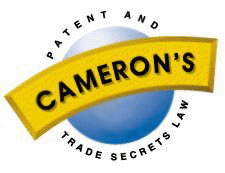
Ingersoll Sargeant Drill Co. v.
Consolidated Pneumatic Tool Co. Ltd.
citation(s): (1907) 25 R.P.C. 61 per Sir Mark Romer
 |
Ingersoll Sargeant Drill Co. v.
|
copyright 1997 Donald M. Cameron, Aird & Berlis
At p. XXX
"One may and ought to refer to the wording of the specification for the purpose of ascertaining the meaning of words and phrases used in the claims, or for the purpose of resolving difficulties of construction occasioned by the claims when read by themselves..."
At p.83
"If the patentee has done this in a claim the language of which is plain and unambiguous, it is not open to your Lordships to restrict or expand or qualify its scope by reference to the body of the specification. Lord Loreburn emphasized this when he said: The idea of allowing a patentee to use perfectly general language in the claim and subsequently to restrict or expand or qualify what is therein expressed by borrowing this or that gloss from other parts of the specification is wholly inadmissible".
At p. 83-84
“Accordingly it comes to this. We are asked to construe the claim with reference to the specification, not in order to understand what the former says, but to make it say things which in fact it does not say at all.
If such a process were admitted all certainly would vanish. No one in construing a claim would know how far he could rely on the words used or how to pick from the specification the qualifying phrases. Patents are not unconditional grants of a monopoly. The patentee must, in return for his privilege, say plainly what is the invention for which he asks protection, so that others may learn that and its limits. And if he chooses separately to claim a subordinate invention he must make plain the metes and bounds of that also. I think the patentee has made it plain in claim 13, if it be fairly construed, and there is no novelty if the interpretation be as I think it is.”
Return to:
Cameron's IT Law: Home Page; Index
Cameron's Canadian Patent & Trade Secrets Law: Home Page; Index